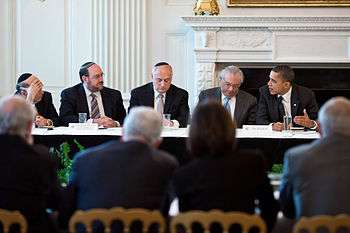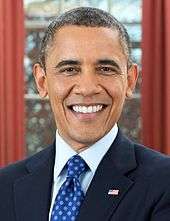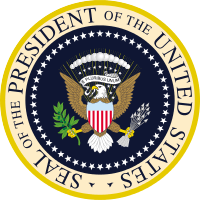Middle Eastern foreign policy of the Barack Obama administration
For purposes of U.S. foreign policy, the Middle East consists of Gaza, Iran, Iraq, Israel, Libya and Syria.
Gaza
On February 2, 2009, President Obama signed a memorandum "directing more than $20 million for 'urgent refugee and migration needs" in Gaza." [1] The 2008–2009 Israeli-Gaza Conflict last from December 27, 2008 to January 18, 2009 when unilateral cease-fires were issued by both the Israeli government and Hamas. This cease-fire was shortly lived and sporadic fighting and attacks would continue to occur into the Obama administration. Israel completed its withdrawal from the Gaza Strip on January 21, 2009, one day after Obama was sworn in as President.[2] $900 million was pledged from Hillary Clinton to help the rebuilding process in Gaza.[3] This was criticized by Matthew Sinclair of the TaxPayers' Alliance and Barbara Crook of the pro-Israel Palestinian Media Watch, who claim that the money will be used to promote terrorism and teach Palestinians to hate non-Muslims and oppose the existence of Israel.[4]
On June 4, 2009, in a speech addressing Muslims in Cairo, Egypt, President Obama said, "Palestinians must abandon violence. Resistance through violence and killing is wrong and does not succeed." He cited the civil rights movement, the Indonesian Revolution of 1998, and the negotiations to end apartheid in South Africa as historical examples of successful nonviolent uprisings to end social, racial, and political injustice and added, apparently in reference to several infamous terrorist attacks by Palestinian organizations, "It is a sign of neither courage nor power to shoot rockets at sleeping children, or to blow up old women on a bus. That is not how moral authority is claimed; that is how it is surrendered."[5] Reacting to the speech, Hamas senior adviser Ahmed Yousef expressed wary approval, telling the pan-Arab news network Al Jazeera, "The things he said about Islam and the Palestinian suffering and their right to have a state is great. It is a landmark and a breakthrough speech. But when it comes to legitimacy of the Israeli right to exist [there are issues]. He knows the Palestinians have to have their own state before recognizing another."[6] "[A]ll we can say is that there is a difference in the statements [from those of former U.S. President George W. Bush], and the statements of today did not include a mechanism that can translate his wishes and views into actions," said Hamas spokesman Fawzi Barhoum.[7]
Saudi Arabia
On October 20, 2010, U.S. State Department notified Congress of its intention to make the biggest arms sale in American history, which was an estimated $60.5 billion purchase by the Kingdom of Saudi Arabia. The package represents a considerable improvement in the offensive capability of the Saudi armed forces.[8]
Iran
The 2009 Iranian presidential election was held on June 12, 2009. Candidates included Ahmadinejad, Mir-Hossein Mousavi, the former Prime Minister of Iran, and Mehdi Karroubi, a former Speaker of the Iranian Parliament. There are reports that the upcoming election had influenced deliberations about the "timing for potential Iran Talks." [9] Following the 2009 Iranian election protests Obama said: "'In 2009 no iron fist is strong enough to shut off the world from bearing witness to the peaceful pursuit of justice. Despite the Iranian government's efforts to expel journalists and isolate itself, powerful images and poignant words have made their way to us through cell phones and computers, and so we have watched what the Iranian people are doing." He also noted that "'This is not about the United States and the West. This is about the people of Iran, and the future that they - and only they - will choose'"
Obama signed the Comprehensive Iran Sanctions, Accountability, and Divestment Act of 2010 on July 1, 2010 to expand sanctions on Iran. The restrictions of the new law are so tight that third countries have warned about the interference with their trade.[10] However under Obama, Iran's oil exports have been halved.[11]
Rouhani's visit to New York City in September 2013 was hailed as major progress in Iran's relations with United States. He previously said that his government is ready to hold talks with the United States after thirty two years. However, after U.S. President Barack Obama requested a one-by-one meeting, Rouhani rejected that. Rouhani denied reports he had refused a meeting with Obama,[12] and felt more time was needed to coordinate such a meeting.[12] On 27 September 2013, a day after the two countries foreign ministers met during the P5+1 and Iran talks, Rouhani had a phone call with President Obama that marked two countries' highest political exchange since 1979.[12][13][14]
Iraq
In February 2009, President Obama named Christopher R. Hill as the incoming U.S. Ambassador to Iraq, replacing the previous Bush-appointee Ryan Crocker, who had been in the post nearly two years.[15] During the first few months Obama was Commander in Chief of the United States Military, it charged and convicted U.S. soldier Clifford Cornell of desertion, and sentenced him to one year in prison for refusing to participate in the Iraq War.[16] The charge occurred February 23, 2009, (in Obama's second month),[17][18] and the conviction occurred April 24, 2009.[16]
On February 27, 2009, at Marine Corps Base Camp Lejeune in North Carolina, Obama announced a deadline for the withdrawal of combat troops from Iraq. According to the president, by August 31, 2010, after nearly seven and a half years of United States military engagement in Iraq, all but a "transitional force" of 35,000 to 50,000 troops will be withdrawn from the Middle Eastern nation. Obama defined the task of the transitional force as "training, equipping, and advising Iraqi Security Forces as long as they remain non-sectarian; conducting targeted counter-terrorism missions; and protecting our ongoing civilian and military efforts within Iraq".[19] Under this plan, the majority of troops will be withdrawn over a year before the deadline in the signed agreement between former President George W. Bush and Prime Minister of Iraq Nouri al-Maliki.[20][21][22] On August 31, 2010, Obama announced in his Oval Office address that the United States combat mission in Iraq was over.
In September 2014, the President announced that he would be returning American forces to Iraq in response to the rise of extreme Islamist non-state actors such as the Islamic State, and the deteriorating humanitarian conditions there.[23]
Israel

Before and after the election of Barack Obama as President of the United States, some Jews, including United States Senator Joseph Lieberman of Connecticut,[24] questioned Obama's commitment to Israeli security.[25][26] Obama maintained that he supports Israel and said he would continue the U.S. alliance with Israel as president.[27][28][29] The Democratic candidate ultimately carried the state of Florida, with its large Jewish population, in the general election, signaling that his efforts to assuage the concerns of Israeli partisans had been at least moderately successful.[30][31]
In January 2009, then-President-elect Obama expressed "concern" over heavy fighting between Israel and Hamas in the Gaza Strip, but said he would leave it to the outgoing Bush administration to express the official U.S. position on the conflict.[32] Obama was criticized by voices on both the left[33][34] and the right[35] for his reluctance to speak out about the Gazan conflict.
In March 2009, Obama appointee and ally Hillary Clinton traveled as Secretary of State to Israel.[36] She warned that Israeli settlements and demolition of Arab homes in East Jerusalem were "unhelpful" to the peace process.[37] Clinton also voiced support for the establishment of a Palestinian state—a solution supported by Israeli Foreign Minister and opposition leader-to-be Tzipi Livni, but not endorsed by Prime Minister-designate Benjamin Netanyahu,[38] with whom she had earlier pledged the United States' cooperation.[39]
The Obama administration has repeatedly pressured the Israeli government led by Prime Minister Benjamin Netanyahu to freeze the growth of Israeli settlements in the West Bank.[40] "The United States does not accept the legitimacy of continued Israeli settlements," the American president said in Cairo in a June 4, 2009, speech to Muslims. "This construction violates previous agreements and undermines efforts to achieve peace. It is time for these settlements to stop." In the same speech, Obama sharply rebuked Holocaust denial, anti-Semitism, and anti-Zionism, saying of the Holocaust, "Six million Jews were killed - more than the entire Jewish population of Israel today. Denying that fact is baseless, ignorant, and hateful." Obama added, "Threatening Israel with destruction - or repeating vile stereotypes about Jews - is deeply wrong, and only serves to evoke in the minds of Israelis this most painful of memories while preventing the peace that the people of this region deserve."[5]
In a 2013 video released by the White House a map of Israel was displayed that did not have territories that are contested, such as the Golan Heights and Jerusalem, as being Israeli territory.[41]
In 2015, the Obama administration expressed frustration over Israel's secret service spying on Iranian nuclear negotiations and leaking the details to Congress.[42]
Libya
After initial skepticism of international involvement to prevent Libyan leader Muammar Gaddafi from using violence to suppress popular demonstrations in his country,[43] the Obama administration crucially backed United Nations Security Council Resolution 1973 to create a Libyan no-fly zone, with United States Ambassador to the United Nations Susan Rice successfully pushing to include language allowing the UN mandate free rein to launch air attacks on Libyan ground targets threatening civilians.[44]
In March 2011, Obama authorized the firing of 110 Tomahawk cruise missiles against targets in Libya, in response to regime actions against rebel forces, to enforce the UN no-fly zone.[45] Controversy arose over whether Obama's use of military force without prior congressional approval was constitutional, with comments by Yale law professor Jack M. Balkin[46] and Salon.com columnist Glenn Greenwald.[47]
Syria
Although the U.S. recalled its ambassador to Syria in 2005, according to United States Secretary of State Hillary Clinton, the Obama administration is reconsidering its relations with the country, which the George W. Bush administration repeatedly accused of sponsoring terrorism during its eight-year tenure. On March 3, 2009, Clinton said the U.S. would "soon" dispatch two envoys to Syria to feel out the situation.[48] On February 16, 2010, President Obama nominated career diplomat and former United States Ambassador to Algeria Robert Ford to be the first United States Ambassador to Syria since 2005.[49]
President Obama sent Special Envoy for Middle East peace George Mitchell on an 8-day tour of the Middle East starting on January 26, 2009 in which Mitchell met with the Palestinian President Mahmoud Abbas, Israeli Prime Minister Ehud Olmert and the Israeli army chief of staff Lt. General Gabi Ashkenaz to discuss the peace process along with other with stops in Egypt, Saudi Arabia, France and Britain where he met with various leaders.
Special Envoy for Middle East peace George Mitchell after holding talks in Ramallah with Palestinian President Abbas who is leader of Fatah which is at odds with Hamas, stated "To be successful in preventing the illicit traffic of arms into Gaza there must be a mechanism to allow the flow of legal goods, and that should be with the participation of the Palestinian Authority." Obama has also stated that "lasting peace requires more than a long cease-fire, and that's why I will sustain an active commitment to seek two states living side by side in peace and security." [50]
Yemen
In December 2009, Obama may have ordered strikes on Yemen with the goal of attacking al-Qaeda.[51][52][53][54]
In early 2011, Obama asked Yemeni president Ali Abdullah Saleh to stop the release of journalist Abdulelah Haider Shaye, who reported US involvement in the bombings.[55][56][57]
References
- ↑ "WhiteHouse: Presidential Memorandum". Retrieved 2009-02-08.
- ↑ Bronner, Ethan; Cowell, Alan (2009-01-21). "Israel Completes Gaza Withdrawal". The New York Times. Retrieved 2009-05-05.
- ↑ Hider, James (2009-03-02). "Hillary Clinton pledges $900 million for rebuilding Gaza". London: The Times. Retrieved 2009-05-05.
- ↑ Starr, Penny (2009-05-05). "Hillary Clinton's $900 Million Pledge to Palestinians Will Promote 'Hate Education,' Panelists Say". Cybercast News Service. Retrieved 2009-05-05.
- 1 2 Pitney, Nico (June 4, 2009). "Obama Speech In Cairo". The Huffington Post.
- ↑ "Obama's speech stirs mixed feelings". Al Jazeera English. June 4, 2009.
- ↑ "Obama seeks common cause with Muslim world". The Oregonian. Associated Press. June 4, 2009.
- ↑ Arms for the King and His Family
- ↑ Omestad, Thomas (2009-02-25). "Obama Administration Weighs Timing for Potential Iran Talks". U.S. News. Retrieved 2009-02-25.
- ↑ "U.S. Iran Sanctions Threaten Ties With Russia - Official.", RIA Novosti, 13 August 2012.
- ↑ "Iran sanctions bill on oil passed by US House."
- 1 2 3 Marcus George (28 September 2013). "Iranians cheer, protest over Rouhani's historic phone call with Obama". Reuters. Dubai. Retrieved 30 September 2013.
- ↑ Obama speaks with Iranian President Rouhani NBC News 27 September 2013
- ↑ Obama talks to Rouhani: First direct conversation between American and Iranian presidents in 30 years National Post 27 September 2013
- ↑ "Hill appointed US Iraq ambassador". Al Jazeera English. February 27, 2009.
- 1 2 "U.S. war deserter, who lived in B.C., sentenced". Montreal Gazette, Nanaimo Daily News. April 28, 2009. Retrieved May 1, 2009.
- ↑ Coastal Courier "Soldier charged with desertion"
- ↑ Bynum, Russ (February 26, 2009). "U.S. soldier charged with desertion after returning from Canada". The Associated Press (also Sun News Canada). Retrieved 3 March 2009.
- ↑ "Obama's Speech at Camp Lejeune, N.C.". The New York Times. February 27, 2009.
- ↑ The Guardian. London http://www.guardian.co.uk/worldlatest/story/0,,-7740969,00.html. Missing or empty
|title=(help) - ↑ Abdul-Zahra, Qassim; Burns, Robert (August 21, 2008). "Officials: Draft accord on troop pullback in Iraq". USA Today. Retrieved May 12, 2010.
- ↑ Stone, Andrea (December 15, 2008). "Bush signs security deal in Iraq". USA Today. Retrieved May 12, 2010.
- ↑ http://www.whitehouse.gov/the-press-office/2014/08/07/statement-president
- ↑ Delong, Matthew (June 4, 2008). "Lieberman Questions Obama's Judgment On Iran and Israel". The Washington Independent.
- ↑ McGeough, Paul (January 3, 2009). "Israel takes little comfort from Obama". The Sydney Morning Herald.
- ↑ Bryant, Ryan (December 1, 2008). "President-elect Obama's plan for Israel comes under question". The Oklahoma Daily.
- ↑ Rohter, Larry (May 13, 2008). "Confronting Questions, Obama Assures Jews of His Support". The New York Times.
- ↑ Butcher, Tim (July 24, 2008). "Barack Obama uses Israel visit to reassure Jewish voters". The Daily Telegraph. London. Telegraph.co.uk.
- ↑ Stockman, Farah (June 5, 2008). "Israel backers hear Obama's vow of fidelity". The Boston Globe.
- ↑ Farrington, Brendan (November 5, 2008). "A rebound from the recount: Obama wins Florida". Fox News. The Associated Press.
- ↑ Sweet, Lynn (October 28, 2008). "Obama leverages Israel trip to woo Florida Jewish voters. Stumps with Bill Clinton in Florida Wednesday". The Chicago Sun-Times.
- ↑ Benhorin, Yitzhak (January 5, 2009). "Obama 'concerned' about Gaza situation". Israel News.
- ↑ Tisdall, Simon (January 4, 2009). "Obama is losing a battle he doesn't know he's in". London. The Guardian.
- ↑ "Obama's Gaza silence condemned". Al Jazeera English. December 31, 2008.
- ↑ Peters, Ralph (January 1, 2009). "Bam Stirs Fears in Israel". The New York Post.
- ↑ Luis Ramirez (2009-03-02). "Hillary Clinton Begins First Foray Into Israel-Palestinian Conflict". VOA. Retrieved 2009-03-03.
- ↑ Ravid, Barak (March 3, 2009). "Clinton: Israel's demolition of East Jerusalem homes harms peace efforts". Haaretz.
- ↑ "Clinton pledges to press for Palestinian state". The Daily Times. March 4, 2009.
- ↑ "In Israel, Clinton pledges to work with new government". The Associated Press. March 3, 2009.
- ↑ "Obama Settlement Demands Stir Rising Tensions in Israel". Fox News. FOX News. June 3, 2009.
- ↑ "Obama's Middle East Map Erases Israeli Territory". Free Beacon. 18 March 2013. Retrieved 31 March 2013.
Previewing the President's trip to Israel, The West Bank and Jordan. White House. 2013. Retrieved 31 March 2013. - ↑ "Geopolitical Tremors: America, Nuclear Talks and the New Middle East". Spiegel Online. March 31, 2015.
- ↑ "U.S. Ambassador to NATO: No-fly zone wouldn't help much". Foreign Policy. 7 March 2011. Retrieved 18 March 2011.
- ↑ Evans, Michael; Coghlan, Tom (18 March 2011). "US plans for military action in Libya". The Australian. Retrieved 18 March 2011.
- ↑ Gaddafi 'not targeted' by allied strikes. BBC News, March 21, 2011.
- ↑ Balkin, Jack. Bradley Manning, Barack Obama and the National Surveillance State. Personal blog of Yale law professor Jack Balkin, March 17, 2011.
- ↑ Greenwald, Glenn. Obama on presidential war-making powers. Salon.com, March 18, 2011.
- ↑ Friedman, Matti (March 3, 2009). "Clinton: US to 'vigorously' promote peace efforts". Associated Press.
- ↑ Colvin, Ross (16 February 2010). "U.S. to return envoy to Syria after five-year absence". Reuters. Retrieved 16 February 2010.
- ↑ Kershner, Isabel (2009-01-29). "Israeli Elections and Gaza Violence Complicate New U.S. Envoy's Peace Mission". The New York Times. Retrieved 2009-02-08.
- ↑ "Cruise Missiles Strike Yemen". ABC News. ABC News (Australia).
- ↑ "Yemeni air attacks on al-Qaida fighters risk mobilising hostile tribes". The Observer. London: Guardian Unlimited. 3 January 2010.
- ↑ "U.S. Cruise Missiles Hit Al Qaeda In Yemen". StrategyPage.com.
- ↑ "In wake of airline incident: Drumbeat for US war in Yemen". The Intelligence Daiyly.
- ↑ White House Stands By Obama Push for Yemeni Journalist to Remain Behind Bars, ABC News, Retrieved 2012-05-04.
- ↑ "Readout of President's Call with President Saleh of Yemen". The White House. Retrieved 2012-03-16.
- ↑ "Why Is President Obama Keeping a Journalist in Prison in Yemen?". thenation.com. Retrieved 2012-03-15.

